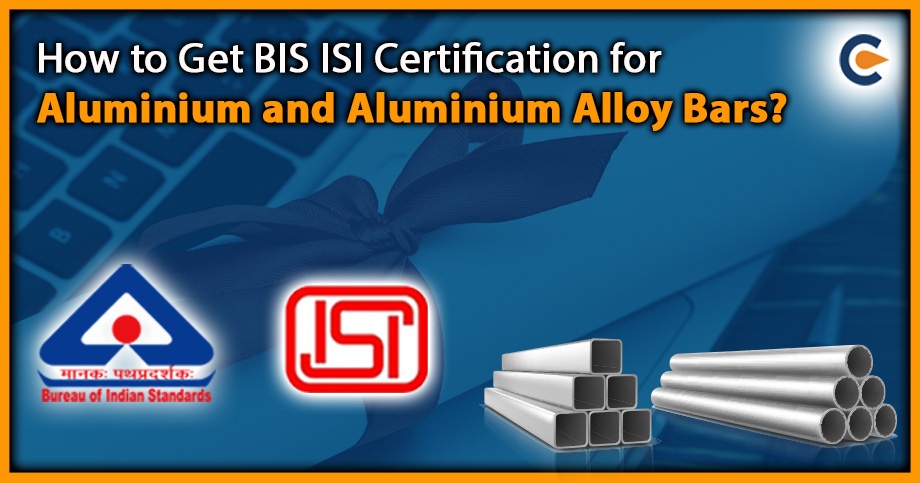In this competitive market, one has to maintain their quality of the manufactured product, otherwise it will be quite difficult to survive in this scenario. While maintaining the product quality, the company must have ISI certification issued by the Bureau of Indian Standards (BIS). The BIS ISI certification for aluminium and aluminium alloy bars is important for both manufacturers and consumers. For manufacturers, the certification is a mark of quality that can enhance their reputation and help them to expand their market share. For consumers, the certification provides assurance that the products they are purchasing meet the necessary standards and are safe and reliable to use. This article discusses about the process of obtaining BIS ISI certification for Aluminium and Aluminium Alloy Bars.
Aluminium and Aluminium alloy bars: An Overview
Aluminium and its alloys have become one of the most widely used materials in various industries due to their excellent properties like high strength-to-weight ratio, corrosion resistance, and excellent electrical and thermal conductivity. However, the quality of the aluminium and aluminium alloy bars used in the manufacturing of critical components such as aerospace and automotive parts, electrical conductors, and structural materials must meet the necessary standards to ensure safety and reliability.
ISI (Indian Standards Institute) certification is a mark of quality for products that meet the Indian Standards specifications. The ISI certification is granted by the Bureau of Indian Standards (BIS), which is a national standardization body that operates under the Ministry of Consumer Affairs, Food & Public Distribution, and Government of India. The BIS is responsible for establishing and maintaining quality standards for various products and services in India.
General Guidelines mentioned under IS 733 in case of Aluminium and Aluminium alloy bars
IS 733 is a standard specification developed by the Bureau of Indian Standards (BIS) for the manufacture of Aluminium and Aluminium alloy bars for general engineering purposes. To obtain BIS ISI certification for aluminium and aluminium alloy bars, the manufacturer must follow the guidelines and specifications laid down by the BIS. The BIS has set standards for various parameters such as chemical composition, mechanical properties, dimensional accuracy, surface finish, and other critical properties that must be met to obtain ISI certification.
Here are the general guidelines mentioned under IS 733 for Aluminium and Aluminium alloy bars:
- Chemical Composition:
The chemical composition of the Aluminium and Aluminium alloy bars should conform to the specified limits. The chemical composition includes the percentage of elements like copper, magnesium, zinc, silicon, and iron, among others. The limits are set to ensure that the material has the desired properties and is suitable for the intended application.
- Mechanical Properties:
The mechanical properties of the Aluminium and Aluminium alloy bars should also conform to the specified limits. The properties include tensile strength, yield strength, elongation, and hardness. These properties are measured using standard test methods and are used to determine the suitability of the material for a particular application.
- Dimensional Tolerances:
The dimensional tolerances of the Aluminium and Aluminium alloy bars should also conform to the specified limits. The tolerances include the diameter, length, straightness, and surface finish. The limits are set to ensure that the bars are of the required size and shape and meet the specified surface finish requirements.
- Manufacturing Process:
The manufacturing process for Aluminium and Aluminium alloy bars should be such that it results in a product that meets the specified requirements. The process includes melting, casting, and hot or cold working. The process should be such that it does not introduce any defects that may affect the performance of the material.
- Marking and Packaging:
The Aluminium and Aluminium alloy bars should be marked with the relevant information, such as the grade, size, and heat number. The bars should also be packaged appropriately to prevent damage during transportation and storage.
These general guidelines mentioned under IS 733 are meant to ensure that the Aluminium and Aluminium alloy bars meet the required specifications and are suitable for their intended applications. Manufacturers of Aluminium and Aluminium alloy bars must adhere to these guidelines to ensure the quality of the product they produce.
Eligibility criteria to qualify for BIS ISI certification for Aluminium and Aluminium alloy bars
To qualify for BIS ISI certification for Aluminium and Aluminium Alloy Bars, the product must meet the following eligibility criteria:
- The bars must be made from high-quality aluminium and aluminium alloy materials.
- The bars must conform to the relevant Indian Standards, such as IS 733, IS 1285, and IS 64430.
- The manufacturer must have a valid BIS license for the production of aluminium and aluminium alloy bars.
- The manufacturer must have a well-established quality management system in place, which conforms to the requirements of the BIS.
- The bars must be subjected to rigorous testing to ensure that they meet the specified quality and performance parameters.
- The bars must be marked with the BIS Standard Mark, which is a guarantee of quality and conformity to Indian Standards.
- Overall, the BIS certification process is designed to ensure that products meet the highest standards of quality, safety, and performance, and that they are manufactured in an environmentally sustainable manner.
- The chemical composition of aluminium & aluminium alloys must be within the specified limits set by the BIS. The mechanical properties like tensile strength, yield strength, elongation, and hardness must also be tested and verified to ensure that they meet the required standards. In addition, the dimensional accuracy of the bars such as diameter, length, and straightness must be checked to ensure that they meet the tolerances specified by the BIS.
- The surface finish of the bars is also an important parameter that is checked during the ISI certification process. The surface finish of the bars must be free from any defects such as cracks, pits, scratches, and other surface irregularities that may affect the performance and durability of the final product.
Once the manufacturer has ensured that the aluminium and aluminium alloy bars meet the necessary standards, they can apply for ISI certification from the BIS. The BIS conducts an initial inspection of the manufacturing facility to verify that the manufacturer has the necessary infrastructure, equipment, and processes in place to produce high-quality bars. The BIS also carries out regular inspections and testing of the products to ensure that they continue to meet the necessary standards.
Documents Required To Produce While Seeking For BIS ISI Certification for Aluminium and Aluminium Alloy Bars
The BIS ISI certification for Aluminium and Aluminium alloy bars requires the following documents:
- Test Reports: The manufacturer needs to provide the test reports of the raw materials used for manufacturing the Aluminium bars. These test reports should be from a laboratory accredited by the National Accreditation Board for Testing and Calibration Laboratories (NABL) or any other recognized authority.
- Manufacturing Process Details: The manufacturer needs to provide the detailed process of manufacturing of the Aluminium bars. It should include information on the equipment used, manufacturing steps, and quality control measures.
- Quality Control Records: The manufacturer needs to provide the quality control records for the Aluminium bars. It should include the records of the testing done during the manufacturing process and the final testing of the finished product.
- Certificate of Conformity: The manufacturer needs to provide a certificate of conformity stating that the Aluminium bars conform to the relevant Indian Standards.
- Registration Certificate: The manufacturer needs to provide a registration certificate from the Bureau of Indian Standards (BIS) for the Aluminium bars.
- Labeling and Packaging Information: The manufacturer needs to provide labeling and packaging information for the Aluminium bars, as per the requirements of the Indian Standards.
Note: The exact documentation requirements may vary based on the specific product and the certification scheme being applied for. It is always advisable to check with the relevant authorities for the latest and most accurate information.
Steps involved in obtaining BIS ISI Certification for Aluminium and Aluminium alloy bars
ISI (Indian Standards Institute) certification is a voluntary certification scheme in India that is intended to ensure that products meet the relevant Indian standards for safety, quality, and performance. Here are the step-by-step processes required for BIS ISI certification for Aluminium and Aluminium alloy bars:
- Application: The first step in obtaining ISI certification is to fill out an application form. The form can be obtained from the Bureau of Indian Standards (BIS)[1] website or from one of their offices.
- Testing: Once the application is received, BIS will conduct a series of tests on the product to ensure it meets the relevant Indian standards. These tests include chemical composition, mechanical properties, dimensions, and surface finish.
- Factory inspection: After the product has been tested, BIS will conduct an inspection of the factory where the product is manufactured to ensure that the manufacturing process complies with the relevant Indian standards.
- Grant of license: If the product passes all the tests and the factory inspection, BIS will grant a license to the manufacturer. The license will specify the relevant Indian standards that the product must meet, and the manufacturer will be allowed to use the ISI mark on their product.
- Surveillance: Once the license has been granted, BIS will conduct regular surveillance visits to the factory to ensure that the product continues to meet the relevant Indian standards.
In summary, the process of obtaining ISI certification for Aluminium and Aluminium alloy bars involves applying for certification, testing the product, inspecting the factory, granting the license, and conducting regular surveillance visits. It is important to note that ISI certification is voluntary in India, but it is often seen as a mark of quality and safety, and can help manufacturers gain a competitive advantage in the market.
Conclusion
In summary, obtaining BIS ISI certification for aluminium and aluminium alloy bars is an important process that ensures that the bars meet the necessary quality standards. Manufacturers must follow the guidelines and specifications set by the BIS and ensure that their products meet the necessary parameters such as chemical composition, mechanical properties, dimensional accuracy, and surface finish. The certification is important for both manufacturers and consumers as it provides assurance of quality and safety.
Read Our Article: How To Conduct ESDD In India? An Overview













